
Kazumi Watanabe (渡辺香津美) is a Japanese guitarist. He was born on October 14, 1953 in Tokyo, Japan.

Osamu Dazai was a Japanese author who is considered one of the foremost fiction writers of 20th-century Japan. A number of his most popular works, such as The Setting Sun (Shayō) and No Longer Human, are considered modern-day classics in Japan. With a semi-autobiographical style and transparency into his personal life, Dazai's stories have intrigued the minds of many readers.
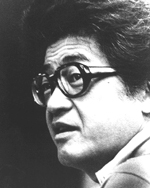
Kōbō Abe, pen name of Kimifusa Abe, was a Japanese writer, playwright, photographer and inventor. Abe has been often compared to Franz Kafka and Alberto Moravia for his modernist sensibilities and his surreal, often nightmarish explorations of individuals in contemporary society.

Haruki Murakami is a Japanese writer. His books and stories have been bestsellers in Japan as well as internationally, with his work being translated into 50 languages and selling millions of copies outside his native country. His work has received numerous awards, including the World Fantasy Award, the Frank O'Connor International Short Story Award, the Franz Kafka Prize, and the Jerusalem Prize.
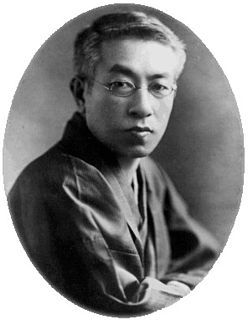
Tōson Shimazaki was the pen-name of Shimazaki Haruki, a Japanese author, active in the Meiji, Taishō and early Shōwa periods of Japan. He began his career as a romantic poet, but went on to establish himself as a major proponent of naturalism in Japanese fiction.

Lost in Translation is a 2003 romantic comedy-drama film written and directed by Sofia Coppola. It stars Bill Murray as aging actor Bob Harris, who befriends college graduate Charlotte in a Tokyo hotel. The movie explores themes of loneliness, insomnia, existential ennui, and culture shock against the backdrop of a modern Japanese city.
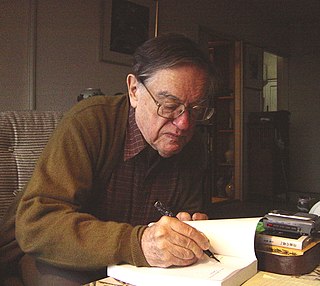
Donald Lawrence Keene was an American-born Japanese scholar, historian, teacher, writer and translator of Japanese literature. Keene was University Professor Emeritus and Shincho Professor Emeritus of Japanese Literature at Columbia University, where he taught for over fifty years. Soon after the 2011 Tōhoku earthquake and tsunami, he retired from Columbia, moved to Japan permanently, and acquired citizenship under the name Kīn Donarudo(キーン ドナルド, "Donald Keene" in the Japanese name order). His poetic nom de plume is Kīn Donarudo(鬼怒鳴門), which he occasionally also used as a nickname.

Kafka on the Shore is a 2002 novel by Japanese author Haruki Murakami. Its 2005 English translation was among "The 10 Best Books of 2005" from The New York Times and received the World Fantasy Award for 2006.

Ju-On: The Grudge is a 2002 Japanese supernatural horror film written and directed by Takashi Shimizu. This film is the third installment in the Ju-On series and the first film to be theatrically released. It premiered at the Screamfest Film Festival in October 2002 and has spawned several sequels and an American remake titled The Grudge, which was released in 2004. The film was followed by Ju-On: The Grudge 2.

Sendai Airport is an international airport located in the city of Natori, Miyagi, 13.6 km (8.5 mi) south southeast of Sendai metropolis, Sendai, Japan. The airport is nicknamed Sendai International Airport.
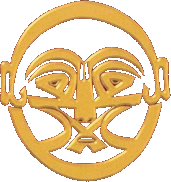
Haal or ḥāl is a special-purpose, temporary state of consciousness, generally understood to be the product of a Sufi's spiritual practices while on his way toward God.
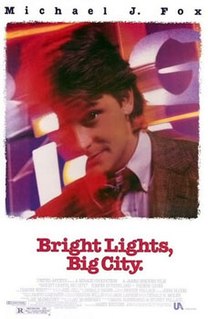
Bright Lights, Big City is a 1988 American drama film directed by James Bridges, starring Michael J. Fox, Kiefer Sutherland, Phoebe Cates, Dianne Wiest and Jason Robards, and based on the novel by Jay McInerney, who also wrote the screenplay. It was the last film directed by Bridges, who died in 1993.
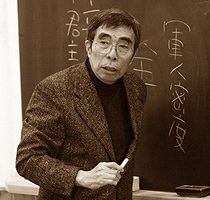
Inoue Hisashi was a leading Japanese playwright and writer of comic fiction. From 1961 to 1986, he used the pen name of Uchiyama Hisashi.
The Grudge is an American horror film series released by Sony Pictures, based on, and a part of the larger Japanese Ju-on franchise. The first installment is a remake of Ju-on: The Grudge and follows a similar storyline to the Japanese film. The sequel, The Grudge 2, is not a remake and follows a unique storyline, albeit still borrowing some plot elements from several Japanese predecessors. The final sequel, The Grudge 3, picks up shortly after the events of the second film.

Peter Tatsuo Doi was a Japanese Cardinal of the Catholic Church. He served as Archbishop of Tokyo from 1937 until his death, and was elevated to the cardinalate in 1960.
Ashita no Kioku/Memories of Tomorrow is a 2006 Japanese drama film starring Ken Watanabe, Higuchi Kanako and directed by Yukihiko Tsutsumi. The film is based on a novel of the same title published by Hiroshi Ogiwara in 2004.
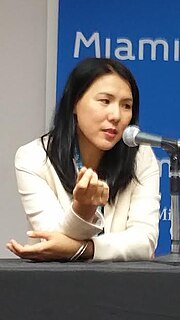
Suki Kim is a Korean American writer, a Guggenheim fellow and the author of the award-winning novel The Interpreter and a New York Times Bestselling literary nonfiction, Without You, There Is No Us: Undercover Among the Sons of North Korea's Elite. Kim claims to be the only writer ever to have lived undercover in North Korea for immersive journalism.

The Sendai River is a river in eastern Tottori Prefecture, Japan. The Sendai is 52 kilometers (32 mi) in length and has a drainage area of 1,190 square kilometers (460 sq mi). The source of the river is in the Chūgoku Mountains. The Sendai flows north through Tottori Prefecture into the Sea of Japan. Under the Rivers Act of 1964 it is designated a Class 1 River, and is managed by the Japanese Ministry of Land, Infrastructure, Transport and Tourism. About 200,000 people live along the course of the river. The Sendai River provides sediment to form the Tottori Sand Dunes, the largest dune system in Japan.

The Flowers of Evil is a Japanese manga series written and illustrated by Shūzō Oshimi. It was serialized in Kodansha's Bessatsu Shōnen Magazine between September 9, 2009, and May 9, 2014, and licensed by Vertical in North America. The story follows a middle school student named Takao Kasuga who's forced into a "contract" by fellow student Sawa Nakamura, after being caught stealing the gym clothes of his crush Nanako Saeki, and the series of events afterwards that follow these three characters. The title of the manga comes from Charles Baudelaire's Les Fleurs du Mal.


















